I have a jsonl file which contains per line both a sentence and the tokens that are found in that sentence. I wish to extract the tokens from each line in the JSON lines file, but my loop only returns the tokens from the last line.
This is the input.
{"text":"This is the first sentence.","_input_hash":2083129218,"_task_hash":-536378640,"spans":[],"meta":{"score":0.5,"pattern":65},"answer":"accept","tokens":[
{"text":"This","id":0},
{"text":"is","id":1},
{"text":"the","id":2},
{"text":"first","id":3},
{"text":"sentence","id":4},
{"text":".","id":5}]}
{"text":"This is the second sentence.","_input_hash":2083129218,"_task_hash":-536378640,"spans":[],"meta":{"score":0.5,"pattern":65},"answer":"accept","tokens":[
{"text":"This","id":0},
{"text":"is","id":1},
{"text":"the","id":2},
{"text":"second","id":3},
{"text":"sentence","id":4},
{"text":".","id":5}]}
I have tried running the following code:
with jsonlines.open('path/to/file') as reader:
for obj in reader:
data = obj['tokens'] # just extract the tokens
data = [(i['text'], i['id']) for i in data] # elements from the tokens
data
The actual result:
[('This', 0), ('is', 1), ('the', 2), ('first', 3), ('sentence', 4), ('.', 5)]
What the result is that I want to get to:
Additional question
Some tokens contain a "label" instead of an "id". How could I incorporate that into the code? An example would be:
{"text":"This is the first sentence.","_input_hash":2083129218,"_task_hash":-536378640,"spans":[],"meta":{"score":0.5,"pattern":65},"answer":"accept","tokens":[
{"text":"This","id":0},
{"text":"is","id":1},
{"text":"the","id":2},
{"text":"first","id":3},
{"text":"sentence","id":4},
{"text":".","id":5}]}
{"text":"This is coded in python.","_input_hash":2083129218,"_task_hash":-536378640,"spans":[],"meta":{"score":0.5,"pattern":65},"answer":"accept","tokens":[
{"text":"This","id":0},
{"text":"is","id":1},
{"text":"coded","id":2},
{"text":"in","id":3},
{"text":"python","label":"Programming"},
{"text":".","id":5}]}
